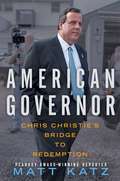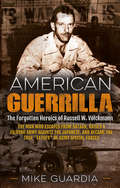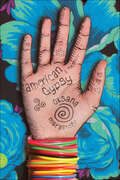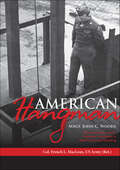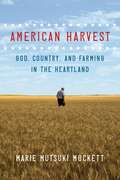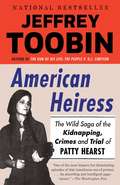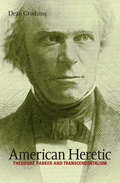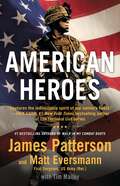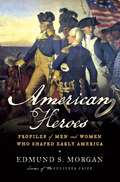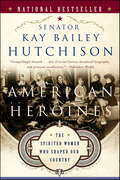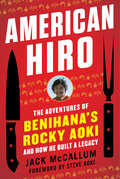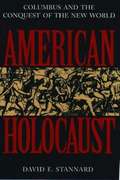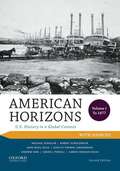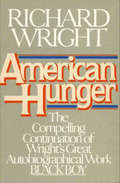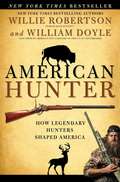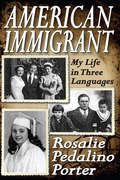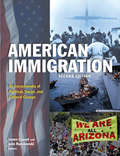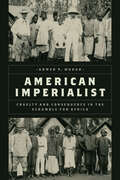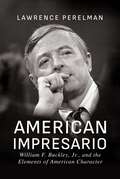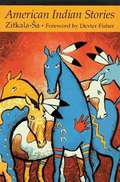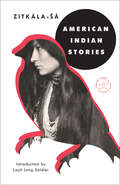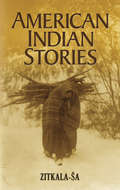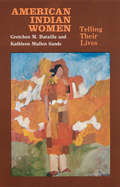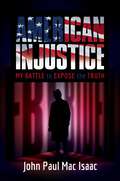- Table View
- List View
American Governor
by Matt KatzThe ultimate insider to Chris Christie's 2016 presidential campaign delivers a definitive biography of the popular and controversial governor of New Jersey--including the true story behind the Bridgegate lane-closure scandal.Journalist Matt Katz has been covering Christie since 2011 and has seen firsthand how the governor appeals to the public through his tactics, rhetoric, and personality. In American Governor, Katz weaves a compelling on-the-ground political narrative that begins with the roots of his family's journey to America and takes us through his upset victory over Governor Jon Corzine and then along the road to his announcement of his candidacy for the highest office in the country. Packed with exclusive information, interviews, and anecdotes, American Governor illustrates how Christie evolved from an unpopular perennial candidate running for local office to the most watched Republican in the country, a populist with leadership skills, charm, and luck seemingly unparalleled by any other up-and-coming politician. Christie has proven himself a dynamic force of nature by emerging wounded but not unbowed after Bridgegate--a scandal that would have destroyed another politician's rising star. A political biography by an inside source who's been on the Chris Christie beat longer than any reporter in New Jersey, American Governor is a thrilling and absorbing look at the modern making of a man and a politician.
American Guerrilla: The Forgotten Heroics of Russell W. Volckmann—the Man Who Escaped from Bataan, Raised a Filipino Army against the Japanese, and Became the True “Father” of Army Special Forces
by Mike GuardiaA main selection of the Military Book Club and a selection of the History Book Club With his parting words, "I shall return," General Douglas MacArthur sealed the fate of the last American forces on Bataan. Yet one young Army Captain named Russell Volckmann refused to surrender. He disappeared into the jungles of north Luzon where he raised a Filipino army of more than 22,000 men. For the next three years he led a guerrilla war against the Japanese, killing more than 50,000 enemy soldiers. At the same time he established radio contact with MacArthur's headquarters in Australia and directed Allied forces to key enemy positions. When General Yamashita finally surrendered, he made his initial overtures not to MacArthur, but to Volckmann. This book establishes how Volckmann's leadership was critical to the outcome of the war in the Philippines. His ability to synthesize the realities and potential of guerrilla warfare led to a campaign that rendered Yamashita's forces incapable of repelling the Allied invasion. Had it not been for Volckmann, the Americans would have gone in "blind" during their counter-invasion, reducing their efforts to a trial-and-error campaign that would undoubtedly have cost more lives, materiel, and potentially stalled the pace of the entire Pacific War. Second, this book establishes Volckmann as the progenitor of modern counterinsurgency doctrine and the true "Father" of Army Special Forces--a title that history has erroneously awarded to Colonel Aaron Bank of the European Theater of Operations. In 1950, Volckmann wrote two army field manuals: Operations Against Guerrilla Forces and Organization and Conduct of Guerrilla Warfare, though today few realize he was their author. Together, they became the US Army's first handbooks outlining the precepts for both special warfare and counter-guerrilla operations. Taking his argument directly to the army chief of staff, Volckmann outlined the concept for Army Special Forces. At a time when US military doctrine was conventional in outlook, he marketed the ideas of guerrilla warfare as a critical force multiplier for any future conflict, ultimately securing the establishment of the Army's first special operations unit--the 10th Special Forces Group. Volckmann himself remains a shadowy figure in modern military history, his name absent from every major biography on MacArthur, and in much of the Army Special Forces literature. Yet as modest, even secretive, as Volckmann was during his career, it is difficult to imagine a man whose heroic initiative had more impact on World War II. This long overdue book not only chronicles the dramatic military exploits of Russell Volckmann, but analyzes how his leadership paved the way for modern special warfare doctrine. Mike Guardia, currently an officer in the US 1st Armored Division is also author of Shadow Commander, about the career of Donald Blackburn, and an upcoming biography of Hal Moore.
American Gypsy: A Memoir
by Oksana MarafiotiA vivid and funny memoir about growing up Gypsy and becoming AmericanFifteen-year-old Oksana Marafioti is a Gypsy. This means touring with the family band from the Mongolian deserts to the Siberian tundra. It means getting your hair cut in "the Lioness." It also means enduring sneering racism from every segment of Soviet society. Her father is determined that his girls lead a better, freer life. In America! Also, he wants to play guitar with B. B. King. And cure cancer with his personal magnetism. All of this he confides to the woman at the American embassy, who inexplicably allows the family entry. Soon they are living on the sketchier side of Hollywood.What little Oksana and her sister, Roxy, know of the United States they've learned from MTV, subcategory George Michael. It doesn't quite prepare them for the challenges of immigration. Why are the glamorous Kraft Singles individually wrapped? Are the little soaps in the motels really free? How do you protect your nice new boyfriend from your opinionated father, who wants you to marry decently, within the clan?In this affecting, hilarious memoir, Marafioti cracks open the secretive world of the Roma and brings the absurdities, miscommunications, and unpredictable victories of the immigrant experience to life. With unsentimentally perfect pitch, AmericanGypsy reveals how Marafioti adjusted to her new life in America, one slice of processed cheese at a time.
American Hangman: MSgt. John C. Woods: The United States Army’s Notorious Executioner in World War II and Nürnberg
by French L. MacLeanThe first biography of MSgt. John C. Woods, infamous US Army hangman of the Nuremberg trials MacLean meticulously separates fact from the mythology surrounding this enigmatic figure This is a follow-on book to The Fifth Field, winner of the 2013 Richard G. Trefry Award from the Army Historical Foundation
American Harvest: God, Country, and Farming in the Heartland
by Marie Mutsuki MockettAn epic story of the American wheat harvest, the politics of food, and the culture of the Great PlainsFor over one hundred years, the Mockett family has owned a seven-thousand-acre wheat farm in the panhandle of Nebraska, where Marie Mutsuki Mockett’s father was raised. Mockett, who grew up in bohemian Carmel, California, with her father and her Japanese mother, knew little about farming when she inherited this land. Her father had all but forsworn it.In American Harvest, Mockett accompanies a group of evangelical Christian wheat harvesters through the heartland at the invitation of Eric Wolgemuth, the conservative farmer who has cut her family’s fields for decades. As Mockett follows Wolgemuth’s crew on the trail of ripening wheat from Texas to Idaho, they contemplate what Wolgemuth refers to as “the divide,” inadvertently peeling back layers of the American story to expose its contradictions and unhealed wounds. She joins the crew in the fields, attends church, and struggles to adapt to the rhythms of rural life, all the while continually reminded of her own status as a person who signals “not white,” but who people she encounters can’t quite categorize.American Harvest is an extraordinary evocation of the land and a thoughtful exploration of ingrained beliefs, from evangelical skepticism of evolution to cosmopolitan assumptions about food production and farming. With exquisite lyricism and humanity, this astonishing book attempts to reconcile competing versions of our national story.
American Heiress: The Wild Saga of the Kidnapping, Crimes and Trial of Patty Hearst
by Jeffrey Toobin<P>From New Yorker staff writer and bestselling author of The Nine and The Run of His Life: The People v. O. J. Simpson, the definitive account of the kidnapping and trial that defined an insane era in American history <P>On February 4, 1974, Patty Hearst, a sophomore in college and heiress to the Hearst family fortune, was kidnapped by a ragtag group of self-styled revolutionaries calling itself the Symbionese Liberation Army. The already sensational story took the first of many incredible twists on April 3, when the group released a tape of Patty saying she had joined the SLA and had adopted the nom de guerre "Tania." <P>The weird turns of the tale are truly astonishing--the Hearst family trying to secure Patty's release by feeding all the people of Oakland and San Francisco for free; the bank security cameras capturing "Tania" wielding a machine gun during a robbery; a cast of characters including everyone from Bill Walton to the Black Panthers to Ronald Reagan to F. Lee Bailey; the largest police shoot-out in American history; the first breaking news event to be broadcast live on television stations across the country; Patty's year on the lam, running from authorities; and her circuslike trial, filled with theatrical courtroom confrontations and a dramatic last-minute reversal, after which the term "Stockholm syndrome" entered the lexicon. <P>The saga of Patty Hearst highlighted a decade in which America seemed to be suffering a collective nervous breakdown. Based on more than a hundred interviews and thousands of previously secret documents, American Heiress thrillingly recounts the craziness of the times (there were an average of 1,500 terrorist bombings a year in the early 1970s). <P>Toobin portrays the lunacy of the half-baked radicals of the SLA and the toxic mix of sex, politics, and violence that swept up Patty Hearst and re-creates her melodramatic trial. American Heiress examines the life of a young woman who suffered an unimaginable trauma and then made the stunning decision to join her captors' crusade. <P> Or did she? <P><b>A New York Times Bestseller</b>
American Heretic
by Dean GrodzinsTheodore Parker (1810-1860) was a powerful preacher who rejected the authority of the Bible and of Jesus, a brilliant scholar who became a popular agitator for the abolition of slavery and for women's rights, and a political theorist who defined democracy as "government of all the people, by all the people, for all the people"--words that inspired Abraham Lincoln. Parker had more influence than anyone except Ralph Waldo Emerson in shaping Transcendentalism in America.In American Heretic, Dean Grodzins offers a compelling account of the remarkable first phase of Parker's career, when this complex man--charismatic yet awkward, brave yet insecure--rose from poverty and obscurity to fame and notoriety as a Transcendentalist prophet. Grodzins reveals hitherto hidden facets of Parker's life, including his love for a woman who was not his wife, and presents fresh perspectives on Transcendentalism. Grodzins explores Transcendentalism's religious roots, shows the profound religious and political issues at stake in the "Transcendentalist controversy," and offers new insights into Parker's Transcendentalist colleagues, including Emerson, Margaret Fuller, and Bronson Alcott. He traces, too, the intellectual origins of Parker's epochal definition of democracy as government of, by, and for the people.The manuscript of this book was awarded the Allan Nevins Prize by the Society of American Historians.
American Heroes: From the #1 bestselling authors of Walk in My Combat Boots
by James Patterson Matt EversmannFrom the authors of Walk in My Combat Boots, “American Heroes is a gripping collection of firsthand accounts…capturing the indomitable spirit of our nation’s finest&” (Jack Carr, #1 New York Times bestselling author of The Terminal List series). U.S. soldiers who served in overseas conflicts—from World War II, Korea, and Vietnam to Iraq and Afghanistan—share true stories of the actions that earned them some of America’s most distinguished military medals, up to and including the Medal of Honor. They never acted alone, but always in the spirit of camaraderie, patriotism, and for the good of our beloved country. There has never been a better time for all of us to think about duty, sacrifice, and what it means to be an American hero. <br><b>New York Times Bestseller</b></br>
American Heroes: Profiles of Men and Women Who Shaped Early America
by Edmund Sears MorganThe last two decades have witnessed an explosion of interest in the founding fathers so intense that a reader or television viewer of today might imagine that America was the creation of beings who were flawless in their wisdom and courage. As Pulitzer Prize-winning historian Edmund S. Morgan shows here, Americans have long been obsessed with their heroes. But, drawing on a lifetime of scholarship, he presents a different cast of characters "among them Indians, witches, heretics, and naysayers," men and women who went against the grain, in addition to the stock figures of our national hagiography. Morgan has mined the seventeenth century and has identified several new heroes, among them Giles Cory and Mary Easty, accused witches, who were put to death when Puritanism went wrong at Salem in 1692. Pressured to reprieve herself by admitting her guilt and naming friends and neighbors as confederates in witchcraft, Easty declared, "I dare not belie my own soul." Her humble statement stands as the ultimate expression of the religious principles that led to the founding of New England, principles temporarily abandoned by the rulers of Massachusetts Bay who tried and sentenced her. While American Heroes celebrates the lives and principles of ordinary Americans, the book also considers the legacy of some of our most prominent colonial and Revolutionary leaders, among them William Penn, Benjamin Franklin, and George Washington. Franklin and Washington are best known for standing against the repressive and often brutal regime of Great Britain's colonial policies, but here Morgan makes the case for their heroism in standing up to their own countrymen. When Americans were demanding precipitate action, Washington and Franklin got the nation off to a good start by knowing when to say no. Whether presenting the scandalous story of a Puritan husband whose on-and-off marriage to a beleaguered Puritan heiress illustrates the nexus between property and sex, or assessing the power of books to subvert the standing order and alter the course of history, American Heroes rises above hagiography in challenging the reader to conceive of American individuality and idealism in new terms. Morgan, who credits his mentor Perry Miller with the best historical mind of his generation, has shown throughout his own career an unrivaled originality and intellectual courage. American Heroes demonstrates Morgan's fascination with our national identity and his abiding affection for the men and women whose character, honesty, and moral courage make plain that heroism in America can be found in unexpected places.
American Heroines: The Spirited Women Who Shaped Our Country
by Kay Bailey HutchisonAs long as there has been an America, the indomitable spirit of American women has shaped both the country's history and society. Regardless of the time and place these women were born each excelled in her respective field, making it easier for the next generation. This is what makes them heroines. In American Heroines, Kay Bailey Hutchison presents female pioneers in fields as varied as government, business, education and healthcare, who overcame the resistance and prejudice of their times and accomplished things that no woman–and sometimes no man –– had done before. Hutchison, a pioneer in her own right, became the first woman elected to the United States Senate from the State of Texas. Interspersed with the stories of America's historic female leaders are stories of today's women whose successes are clearly linked to those predecessors. Would Sally Ride have been given the chance to orbit the earth had Amelia Earhart not flown solo across the Atlantic Ocean fifty years before? Had Clara Barton not nursed wounded soldiers on Civil War battlefields, aid may not have reached the millions it did while the Red Cross was in the hands of women like Elizabeth Dole and Bernadine Healy. Had Oveta Culp Hobby not been appointed the first Secretary of the Department of Health and Education by President Eisenhower, the country may have been deprived of such leaders as Secretary of State Madeline Albright and National Security Advisor Condoleeza Rice. As a young girl, Senator Hutchison dreamed of an America where the qualifier "the first woman" had become obsolete. The profiles contained in American Heroines, illustrate how her dream is coming true, one courageous step at a time.
American Hiro: The Adventures of Benihana's Rocky Aoki and How He Built a Legacy
by Jack McCallumAn in-depth biography of the famed Japanese American restaurateur, his rags to riches story, his determination in business, and his zest for life.“Traveling the world with my father, watching him interact with people, famous and ordinary, observing up close his balls-out sense of adventure, and having a larger-than-life personality to live up to had a profound effect on me and the formation of my character.” —From the foreword by Steve Aoki, Grammy–nominated producer and Billboard Award–winning DJHiroaki “Rocky” Aoki was a man who succeeded in everything he pursued—from world-class wrestling, ballooning, underwater exploration, and car and boat racing to founding Benihana. Rocky’s passion for life infected all around him and accelerated the exchange of Japanese culture and cuisine with America. His rags to riches story, from dishwasher and busboy to owner of a multi-million-dollar restaurant empire, is a wild American dream realized unlike any other. Running and expanding the business would be all-consuming for most people—not to mention battling the perception of otherness—but Rocky would not be deterred. His determination for the business rivaled the drive he demonstrated in his other interests, some of which almost killed him. American Hiro by Jack McCallum, who had full access to Rocky Aoki and those in his enterprises, provides the only full inside account of one of the most famous symbols of cultural assimilation and capitalistic zeal in modern US history—a champion in business, sports, and life.
American History
by Michael B. Stoff James West Davidson Jennifer L. BertoletIn 'They Say,' James West Davidson recounts the first thirty years in the passionate life of Ida B. Wells--as well as the story of the great struggle over the meaning of race in post-emancipation America. Davidson captures the breathtaking and often chaotic changes that swept the South as Wells grew up in Holly Springs, Mississippi: the spread of education among free blacks, the rise of political activism, and the bitter struggles for equality in the face of entrenched social custom. When Wells came of age she moved to bustling Memphis, where her quest for personal fulfillment was thwarted as whites increasingly used race as a barrier to separate blacks from mainstream America. Davidson traces the crosscurrents of these cultural conflicts through Wells's forceful personality, intertwining her struggle to define herself with her early courageous, and often audacious, behavior. When a conductor threw her off a train for refusing to sit in the segregated car, she sued the railroad--and won. When she protested conditions in segregated Memphis schools, she was fired--and took up journalism. And in 1892, when an explosive lynching rocked Memphis, Wells embarked fully on the career for which she is now remembered, as outspoken anti-lynching writer and lecturer. Period photographs from postcards, newspapers, and Wells's own diary further engage readers in this dynamic story. Richly researched and deftly written, the book offers a gripping portrait of the young Ida B. Wells, who directly encountered and influenced the evolving significance of race in America.
American Holocaust: The Conquest of the New World
by David E. StannardHow we destroyed more than one-hundred million of the earlier inhabitants of the New World.
American Horizons: U. S. History in a Global Context (Volume 1 #1877)
by Michael Schaller Janette Thomas Greenwood Aaron Sheehan-Dean Robert Schulzinger Andrew Kirk Sarah J. Purcell John Bezis-SelfaAmerican Horizons, Second Edition, is the only U. S. History survey text that presents the traditional narrative in a global context. The authors use the frequent movement of people, goods, and ideas into, out of, and within America's borders as a framework. This unique approach provides afully integrated global perspective that seamlessly contextualizes American events within the wider world. The authors, all acclaimed scholars in their specialties, use their individual strengths to provide students with a balanced and inclusive account of U. S. history. Presented in two volumes for maximum flexibility, American Horizons, Second Edition, illustrates the relevance of U. S. history to American students by centering on the matrix of issues that dominate their lives. These touchstone themes include population movements and growth, the evolving definitionof citizenship, cultural change and continuity, people's relationship to and impact upon the environment, political and ideological contests and their consequences, and Americans' five centuries of engagement with regional, national, and global institutions, forces, and events. In addition, thisbeautifully designed, full-color book features hundreds of photos and images and more than 100 maps.
American Hunger
by Richard WrightAmerican Hunger, published posthumously in 1977, was originally intended as the second volume of Black Boy.
American Hunter
by William Doyle Willie RobertsonNew York Times bestselling author and star of A&E's Duck Dynasty, Willie Robertson, teams up with William Doyle, the bestselling co-author of American Gun, to share the history of America's most well known hunters.American Hunter is the first book ever to compile a chronological history of America's greatest hunters. Based on the powerful personalities of colorful men and women, this book begins with the Plains Indians and moves through legendary hunters like Daniel Boone, Davy Crockett, Kit Carson, Buffalo Bill, Teddy Roosevelt, Ernest Hemingway, Lyndon Johnson, and more. Also included are the histories of American fox, rabbit, deer, squirrel, duck, goose, and big-game hunting, as well as action biographies of classic hunting weapons. Author Willie Robertson, famed hunter of Duck Dynasty and Duck Commander, lends his voice to share this bodacious collection of true stories that you'll want to tell around the campfire after a long day's hunt. As Teddy Roosevelt put it, "The virility, clear-sighted common sense and resourcefulness of the American people is due to the fact that we have been a nation of hunters and frequenters of the forest, plains, and waters." It's about time we honor American hunters with a book that tells their incredible stories of skill, courage, survival, and downright bodaciousness. American Hunter is the perfect book for everyone who enjoys amazing tales of American history and for those who love hunting, sport shooting, and wide open spaces.
American Immigrant: My Life in Three Languages
by Rosalie PorterImmigration is one of the most contentious issues in twenty-first-century America. In forty years, the American population has doubled from 150 to 300 million, about half of the increase due to immigration. Discussions involving legal and illegal status, assimilation or separatism, and language unity or multilingualism continue to spark debate. The battle to give five million immigrant children America's common language, English, and to help these students join their English-speaking classmates in opportunities for self-fulfillment continues to be argued. American Immigrant is part memoir and part account of Rosalie Pedalino Porter's professional activities as a national authority on immigrant education and bilingualism.Her career began in the 1970s, when she entered the most controversial arena in public education, bilingualism. This book chronicles the political movement Porter helped lead, one that succeeded in changing state laws in California, Arizona, and Massachusetts. Programs that had segregated Latino children by language and ethnicity for years, diminishing their educational opportunities, were removed with overwhelming public support. New English-language programs in these states are reporting improved academic achievement for these students.This book is also Porter's testament to the boundless opportunities for women in the United States, and to the unique blending of ethnicities and religions and races into harmonious families, her own included, that continues to be a true strength of the United States Porter examines women's roles, beginning in the 1940s and continuing through the millennium, from the vantage point of someone who grew up in a working-class, male-dominated family. She explores the emotional price exacted by dislocation from one's native land and traditions; traveling and living in the Middle East, Europe, and Asia; and the evolving character of marriage and family in twenty-first-century America.
American Immigration: An Encyclopedia of Political, Social, and Cultural Change
by James Ciment John RadzilowskiThoroughly revised and expanded, this is the definitive reference on American immigration from both historic and contemporary perspectives. It traces the scope and sweep of U.S. immigration from the earliest settlements to the present, providing a comprehensive, multidisciplinary approach to all aspects of this critically important subject.Every major immigrant group and every era in U.S. history are fully documented and examined through detailed analysis of social, legal, political, economic, and demographic factors. Hot-topic issues and controversies - from Amnesty to the U.S.-Mexican Border - are covered in-depth. Archival and contemporary photographs and illustrations further illuminate the information provided. And dozens of charts and tables provide valuable statistics and comparative data, both historic and current. A special feature of this edition is the inclusion of more than 80 full-text primary documents from 1787 to 2013 - laws and treaties, referenda, Supreme Court cases, historical articles, and letters.
American Imperialist: Cruelty and Consequence in the Scramble for Africa
by Arwen P. MohunThis biography of “African explorer” Richard Dorsey Mohun, written by one of his descendants, reveals how American greed and state power helped shape the new imperial order in Africa. Richard Dorsey Mohun spent his career circulating among the eastern United States, the cities and courts of Europe, and the African continent, as he served the US State Department at some points and King Leopold of Belgium at others. A freelance imperialist, he implemented the schemes of American investors and the Congo Free State alike. Without men like him, Africa’s history might have unfolded very differently. How did an ordinary son of a Washington bookseller become the agent of American corporate greed and European imperial ambition? Why did he choose to act in ways that ranged from thoughtless and amoral to criminal and unforgivable? With unblinking clarity and precision, historian Arwen P. Mohun interrogates the life and actions of her great-grandfather in American Imperialist. She seeks not to excuse the man known as Dorsey but to understand how individual ambition and imperial lust fueled each other, to catastrophic ends. Ultimately, she offers a nuanced portrait of how her great-grandfather’s pursuit of career success and financial security for his family came at a tragic cost to countless Africans.
American Impresario: William F. Buckley, Jr., and the Elements of American Character
by Lawrence PerelmanIn 1994, William F. Buckley, Jr., the conservative icon, received a letter from an eighteen-year-old aspiring pianist by the name of Lawrence Perelman, the son of Soviet Jewish immigrants. Buckley&’s response sparked a remarkable cross-generational friendship during which Perelman learned of the timeless elements of Buckley&’s character, and the central role of classical music in Buckley&’s American vision.Lawrence Perelman, an eighteen-year-old aspiring pianist and son of Soviet Jewish immigrants, wrote a letter to William F. Buckley, Jr., the conservative icon, in 1994. A remarkable cross-generational friendship was sparked by Buckley&’s response. During their friendship Perelman would go on to learn of the timeless elements of Buckley&’s character and the central role of classical music in Buckley&’s American vision. In 2025, the 100th anniversary of Buckley&’s birth, this book delves into some of Buckley&’s virtues which Perelman witnessed firsthand and argues that those virtues can transform the fabric of America&’s character. Their friendship spanned from 1995 to February 27, 2008, the day Buckley passed away in his Connecticut home while Perelman practiced piano in a nearby room for a private recital that evening for Buckley and friends that would never happen. American Impresario is a portrait of Buckley, the impresario of the conservative movement, man of faith, Cold Warrior, bulwark against Anti-Semitism, Renaissance man, musician, and mentor to countless people who continue their work today. This book will inspire readers, both young and old, to emulate Buckley&’s virtues, including a return to civil discourse, anonymous philanthropy, faith, patriotism and fostering relationships between mentor and protégé, as part of a goal to reweave the fabric of our nation&’s character.
American Indian Stories
by Zitkala-saAutobiography of Zitkala-Sa (aka Gertrude Bonnin), a Dakota Sioux Indian, and tales she heard from the oral tradition of her tribe. First published in 1921.
American Indian Stories (Modern Library Torchbearers)
by Zitkala-SaA groundbreaking Dakota author and activist chronicles her refusal to assimilate into nineteenth-century white society and her mission to preserve her culture—with an introduction by Layli Long Soldier, winner of the National Book Critics Circle Award and the PEN/Jean Stein Book Award for Whereas Bright and carefree, Zitkála-Šá grows up on the Yankton Sioux reservation in South Dakota with her mother until Quaker missionaries arrive, offering the reservation’s children a free education. The catch: They must leave their parents behind and travel to Indiana. Curious about the world beyond the reservation, Zitkála-Šá begs her mother to let her go—and her mother, aware of the advantages that an education offers, reluctantly agrees. But the missionary school is not the adventure that Zitkála-Šá expected: The school is a strict one, her long hair is cut short, and only English is spoken. She encounters racism and ridicule. Slowly, Zitkála-Šá adapts to her environment—excelling at her studies, winning prizes for essay-writing and oration. But the price of success is estrangement from her cultural roots—and is it one she is willing to pay? Combining Zitkála-Šá’s childhood memories, her short stories, and her poetry, American Indian Stories is the origin story of an activist in the making, a remarkable woman whose extraordinary career deserves wider recognition.The Modern Library Torchbearers series features women who wrote on their own terms, with boldness, creativity, and a spirit of resistance.
American Indian Stories (Native American)
by Zitkala-SaBorn on South Dakota's Yankton Reservation in 1876, Zitkala-Sa felt "as free as the wind that blew my hair, and no less spirited than a bounding deer." At the age of 8, she traded her freedom for the iron discipline of a Quaker boarding school. Forever afterward, the Lakota Sioux author struggled to find a balance between Indian and white society. These autobiographical essays, short stories, and political writings offer her poignant reflections on being stranded between two worlds. Zitkala-Sa, who attended and taught at the Carlisle Indian Industrial School in Pennsylvania, was a founder of the National Council of American Indians and among the first Native Americans to record tribal legends and oral traditions. This collection opens with her reminiscences of the reservation, her schooling at an institution determined to "civilize" Indians, and her experiences as a teacher. Zitkala-Sa also recounts tales rooted in Sioux traditions, including "A Warrior's Daughter," in which a courageous woman risks everything for her husband-to-be; "The Trial Path," an account of tribal justice after a murder; and "The Sioux," in which a son must kill twice to save his father from starvation. The book concludes with incisive observations on government mistreatment of Indians and a call for the complete enfranchisement of Native Americans into mainstream society.
American Indian Women: Telling Their Lives
by Gretchen M. Bataille Kathleen Mullen SandsIndian women's autobiographies have been slighted because of the assumption that women had a secondary and insignificant role in Indian society. Gretchen M. Bataille and Kathleen Mullen Sands cogently demonstrate in this book the creative vitality of autobiographies that, despite differences in style and purpose, clarify the centrality of women in American Indian cultures. Included is a comprehensive, annotated bibliography or works by and about American Indian women.
American Injustice: My Battle to Expose the Truth
by John Paul Mac IsaacThis is the story of how I tried to get the Hunter Biden laptop evidence to the authorities.My life changed forever on April 12, 2019, when Hunter Biden stumbled into my shop requesting data recovery from one of his liquid-damaged laptops. After his father announced his candidacy for president of the United States, and Hunter failed to pay for and collect his computer, fear for my safety grew. There was paperwork in Hunter&’s possession giving me permission to examine and copy his data—someone was going to come looking for the laptop, and come looking for me. Concerned that I was sitting on evidence in a criminal investigation, I set out to hand everything over to the FBI. But, feeling betrayed by the FBI&’s inaction in providing the laptop as evidence during the impeachment trial, I then turned to Congress, and ultimately, to a lawyer for the president, Rudy Giuliani. When the story broke, Big Tech and social and mainstream media blocked the reporting. I was instantly labeled as a hacker and a criminal. My actions were labeled Russian disinformation, and it didn&’t take long before people started attacking my business and my character, forcing me to close my shop and flee the state.
